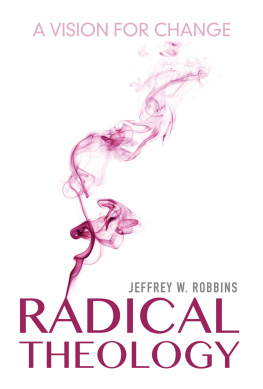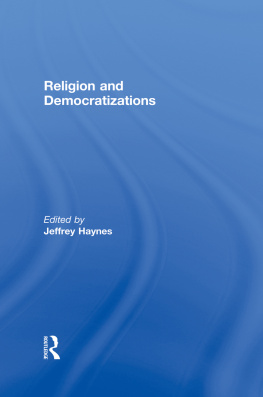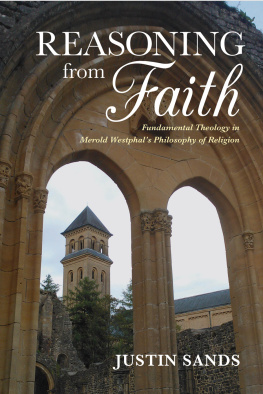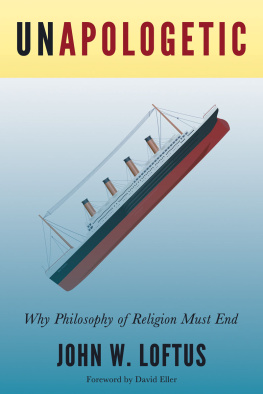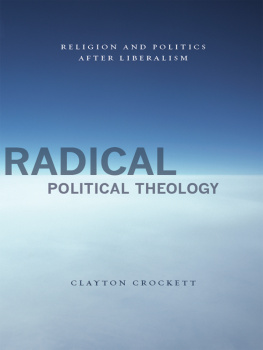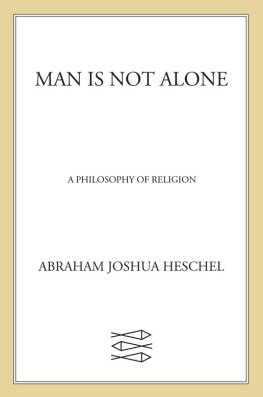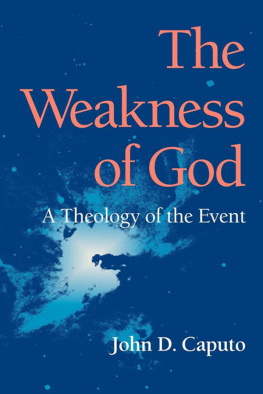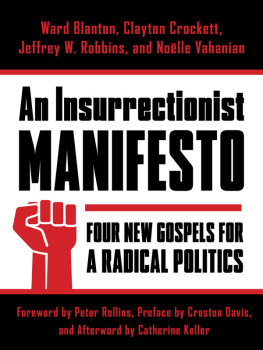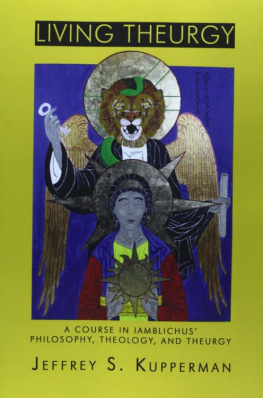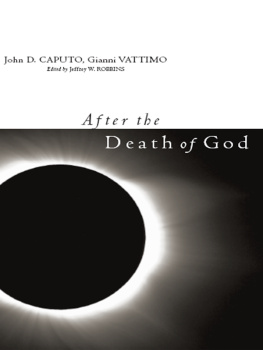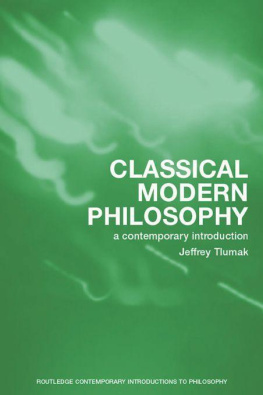Jeffrey W. Robbins - Radical Theology (Philosophy of Religion)
Here you can read online Jeffrey W. Robbins - Radical Theology (Philosophy of Religion) full text of the book (entire story) in english for free. Download pdf and epub, get meaning, cover and reviews about this ebook. year: 2016, publisher: Indiana University Press, genre: Religion. Description of the work, (preface) as well as reviews are available. Best literature library LitArk.com created for fans of good reading and offers a wide selection of genres:
Romance novel
Science fiction
Adventure
Detective
Science
History
Home and family
Prose
Art
Politics
Computer
Non-fiction
Religion
Business
Children
Humor
Choose a favorite category and find really read worthwhile books. Enjoy immersion in the world of imagination, feel the emotions of the characters or learn something new for yourself, make an fascinating discovery.
- Book:Radical Theology (Philosophy of Religion)
- Author:
- Publisher:Indiana University Press
- Genre:
- Year:2016
- Rating:5 / 5
- Favourites:Add to favourites
- Your mark:
- 100
- 1
- 2
- 3
- 4
- 5
Radical Theology (Philosophy of Religion): summary, description and annotation
We offer to read an annotation, description, summary or preface (depends on what the author of the book "Radical Theology (Philosophy of Religion)" wrote himself). If you haven't found the necessary information about the book — write in the comments, we will try to find it.
Radical Theology (Philosophy of Religion) — read online for free the complete book (whole text) full work
Below is the text of the book, divided by pages. System saving the place of the last page read, allows you to conveniently read the book "Radical Theology (Philosophy of Religion)" online for free, without having to search again every time where you left off. Put a bookmark, and you can go to the page where you finished reading at any time.
Font size:
Interval:
Bookmark:
RADICAL THEOLOGY
INDIANA SERIES IN THE PHILOSOPHY OF RELIGION
Merold Westphal, editor
THEOLOGY
A VISION FOR CHANGE
JEFFREY W. ROBBINS

This book is a publication of
Indiana University Press
Office of Scholarly Publishing
Herman B Wells Library 350
1320 East 10th Street
Bloomington, Indiana 47405 USA
iupress.indiana.edu
2016 by Jeffrey W. Robbins
All rights reserved
No part of this book may be reproduced or utilized in any form or by any means, electronic or mechanical, including photocopying and recording, or by any information storage and retrieval system, without permission in writing from the publisher. The Association of American University Presses Resolution on Permissions constitutes the only exception to this prohibition.
The paper used in this publication meets the minimum requirements of the American National Standard for Information SciencesPermanence of Paper for Printed Library Materials, ANSI Z39.48-1992.
Manufactured in the United States of America
Cataloging information is available from the Library of Congress.
ISBN 978-0-253-02202-8 (cloth)
ISBN 978-0-253-02212-7 (ebook)
1 2 3 4 5 21 20 19 18 17 16
For my friend and colleague
John Hinshaw
I want to take this opportunity to thank the many readers, critics, and conversation partners I have had through the years who have contributed to the effort put forth in this book. My thanks must begin with a close-knit group of pathbreaking scholars who I first read and met during my years under the tutelage of Charles Winquist at Syracuse University. They include Thomas J. J. Altizer, Carl Raschke, Mark C. Taylor, and Edith Wyschogrod. Individually and collectively they not only contributed to defining radical death-of-God theology for a generation and for the deconstructive postmodern a/theology that followed but also taught me how intimate and personal the scholarly pursuit could be. I mean this in the best possible way. I remember being surprised to discover they were all friends, that arguments were forged and insights gleaned just as often over dinner or drinks as in the privacy of ones study. It was then that I began reading their articles and books as conversations with and commentaries about one another. And it was thereby that, somewhere along the line, I came to be among the initiated.
So as not to give the false impression that this was an exclusive or exclusionary group of scholars, I should add that it was during the same period and among those same conversation partners that I was introduced to such inspirational figures as the great historians of religion Huston Smith, Charles Long, and David Chidester. I remember how each in his own way pressed us graduate students, who were under the thrall of postmodern theory, to consider more fully questions of historicity, materiality, and economics. Their personal challenge, along with the rigor of their methodology, has remained with me just as assuredly as the pronouncements of the radical theologians, both old and new. If this book achieves its goal of reactivating and expanding the tradition of radical theology, then that is the fruit of the seeds first planted by them.
In the decade since, the scholarly dialogues have developed into enduring friendships. The closest circle includes my colleagues at Lebanon Valley College (LVC), a dedicated and innovative group of professionals with whom Im constantly impressed because of their genuine commitment to students. To avoid the risk of leaving a name out, I will just say thank you en masse to the LVC transdisciplinary collective. You know who you are, and I am most grateful to you all for mustering the courage to say yes to our collective vision to excite and empower students, to collaborate and innovate, and to risk the reenvisioning of a liberal arts education. The book is dedicated to John Hinshaw, who is part of that collective whether he wants to be or not. Although no theologian himself, John is a different sort of radicalLVCs resident stalwart supporter of the AAUP, committed to collective action; a keen observer of both local and global politics; and the sort of loyal friend with whom you can just as well argue as laugh, and always at a feverish pitch. This book marks the ten-year anniversary of the Radical Reading Group we conducted together with a group of students. The reading group was empowered by the radical pedagogy of Paulo Freire. Back then, Jordan Miller was a rabble-rousing, ring-leading undergraduate student. He has since become a first-rate radical theologian in his own right, finding original ways to read, apply, and affirm the lineage in concert with contemporary scholarship and current events. Much of the argumentation in this book was forged by my conversations with him in regard to his own developing research.
There are many others, of course, who are constant touchstones for me. The influence of John Caputo and Catherine Malabou should be clear to readers of this book. They serve not only as the two main interlocutors who provide the books organizational structure but also as friends and role models. Catherine Keller is more an unspoken point of reference throughout the book. I regard her as the most creative and important theologian of our time, and I have appreciated the ways she has gently chided and instructed me through the years. Her legion of students and circle of friends provide direction and inspiration for all of us working at the intersections of religion, philosophy, politics, and critical theory. To Sharon Baker, Ward Blanton, Karen Bray, J. Kameron Carter, Clayton Crockett, Creston Davis, Bo Eberle, Gavin Hyman, Katharine Sarah Moody, Elias Ortega, Hollis Phelps, Elijah Prewitt, Keith Putt, Joshua Ramey, Alan Richard, Chris Rodkey, Mary-Jane Rubenstein, George Schmidt, Phil Snider, and Santiago ZabalaI look forward to our next email exchange; to your next article, book, or talk; or to the next conference or occasion at which the passion will run deeper than the ridicule.
Working with Indiana University Press on this publication has been a real privilege and pleasure. Most especially, I appreciate the critical and constructive feedback I received from the series editor, Merold Westphal, and the sage advice from Dee Mortensen for making the manuscript into a better book. I owe a special thanks as well to Gretchen Otto for her masterful job preparing the manuscript for publication, and to Victoria Gluszko for her assistance with the index.
And, as always, I owe my deepest gratitude to my wife, Nolle Vahanian. Even if our time and conversations are largely consumed with the mundane, I know how lucky I am to have someone with whom to share this intellectual journey. She is my soul mate, and her encouragement and support mean more than anything to me.
is adapted from a presentation first given at Salve Regina University and subsequently published in the edited volume by Mike Grimshaw, The Counter-Narratives of Radical Theology and Popular Music (Palgrave Macmillan, 2014).
RADICAL THEOLOGY
In one of the most stirring images in cinematic history, from the 1962 classic Lawrence of Arabia, we see T. E. Lawrence taunt God and nature alike in a daring attempt to save the life of Gasim, who was left for dead in the desert. Braving near-certain death himself, Lawrence defies the command of the more experienced, desert-dwelling Sherif Ali to backtrack into the heart of the desert only an hour before the break of day and the rise of the scorching sun. Without water, without a guide, and at the point of utter exhaustion, Lawrence is nevertheless undeterred. The words exchanged are as telling as they are well remembered: Sherif tells Lawrence that in Gods name, he must not go back, that if he does, he will surely die. Sherif also tells Lawrence in Gods name that Gasims time has come, that it is written. Lawrences response as he departs is that nothing is written. As he rides away on camelback, Sherif yells out, implores, and condemns: Go back then. What did you bring us here for with your blasphemous conceit? He then adds insult to the accusation with a tone of righteous outrage, disappointment, and despair, not only telling Lawrence that he would never reach their destination in Akaba, but also, invoking the unmistakable colonial overtones, calling him an English blasphemer. With wounded pride and defiance, Lawrence responds again, I shall be at Akaba. Then, pointing to his head, he adds with blasphemous emphasis, That is written in here.
Next pageFont size:
Interval:
Bookmark:
Similar books «Radical Theology (Philosophy of Religion)»
Look at similar books to Radical Theology (Philosophy of Religion). We have selected literature similar in name and meaning in the hope of providing readers with more options to find new, interesting, not yet read works.
Discussion, reviews of the book Radical Theology (Philosophy of Religion) and just readers' own opinions. Leave your comments, write what you think about the work, its meaning or the main characters. Specify what exactly you liked and what you didn't like, and why you think so.

